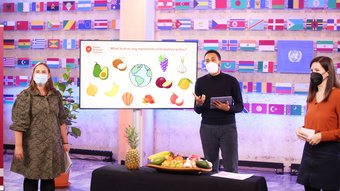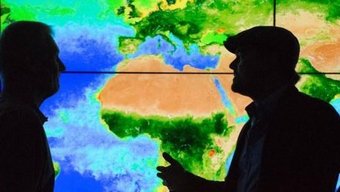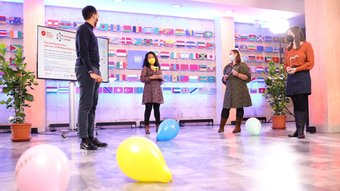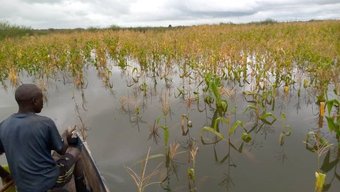Categories
Reflections on the 9th Global Dialogue Platform
Over three days in December 2021, the anticipatory action community came together with those from other sectors for the 9th Global Dialogue Platform. Here, some participants share their reflections on the event.
You can also watch our summary video from the event, and read about a few (of the many) highlights from the three days here.
Erlich-Honest Zauisomue, researcher, University of Namibia
“I was intrigued to share the pain and suffering of our vulnerable communities, whose livelihoods are continually disrupted by drought. Droughts and floods in Namibia alter the livelihoods of poor, marginalized and indigenous people, with malnutrition and malnourishment becoming a daily occurrence for many.
“Sharing these results, and the new 4As strategic alliance, let participants know that we accept the challenges faced, but are also responsible for creating the future we want! It is through proactive, innovative collaboration between different humanitarian agencies, academia, NGOs and national governments that we can lessen the burden caused by disasters.
“My passion is to develop a drought-monitoring system informed by indigenous people and focusing on traditional and historical knowledge, wisdom and insight. At the Global Dialogue Platform, I engaged with other participants and learned that we must collaborate more and aggressively unpack the natural indicators for different hazard events, so that we can proactively plan for better intervention methods and strategies, and in a timely manner.
“As we know, during cyclones, droughts or floods, the school calendar is heavily disrupted, and I hope that next year we hear from children and younger generations - their views, hopes and aspirations. I think we are proactively planning for the future - but without the future being involved!”
Marion Khamis, disaster risk management and resilience specialist, FAO regional office for Latin America and the Caribbean
“I want to congratulate the organizers for such an amazing opportunity to connect with this expanding and diverse community. A lot of progress was reported in developing systems and putting them to work - very impressive! However, there is still so much to do.
“Hunger appears to be one of the biggest challenges. The good news is that anticipatory action has so much to offer in this regard, especially if we understand that it can go much further than emergency preparedness. It has a lot of potential as a short-term risk-mitigating strategy, and using it to protect livelihoods will give concrete results in terms of addressing immediate needs, as well as the root causes of hunger: people’s capacity to produce and access food. I saw broad consensus that to succeed, we need to build alliances.
“I particularly enjoyed the sessions that allowed us to share progress and challenges specific to the LAC region, together with Red Cross/Red Crescent, WFP, government and FAO colleagues. We have so much to learn from each other about how to deliver anticipatory action on the ground - quickly, effectively and to scale.
“In future platforms, I would love to see more from different communities sharing their views on risks, what anticipatory action should tackle, and how. What would they say about their own role? Going that far in a regional or global event would be challenging - but we can try to open up this wonderful circle!”
Kaustubh Devale, emergency and rehabilitation officer, FAO Afghanistan
“Participating in this year’s Global Dialogue Platform was very useful, especially after the Asia-Pacific Regional Dialogue. Going from a regional perspective to a global one is very enriching. I was also thankful that FAO Afghanistan was given this opportunity to share and present our experiences of anticipatory action in a conflict setting.
“One key takeaway for me is the need to engage more critically and technically with colleagues from the anticipatory action and conflict-peace teams, on the framing and conceptualization of how anticipatory action can be designed in a conflict context. As a community, I think we need to be very clear on what our objectives are - or should be - and what outcomes we would like to see through anticipatory action.
“Since anticipatory action in a conflict setting is different to hydro-meteorological shocks, there are three areas that I would like to continue discussing with the community. Firstly, how do we maximize the impact of conflict-sensitive anticipatory actions, given that there tends to be a short window of opportunity to implement these? Secondly, given the fluid, dynamic nature of stakeholders in conflict settings, how do we reconcile this with the need to account for these diverse actors when designing actions? How can we engage with them, formally or informally? And finally, what kind of early-warning systems and forecasts are we going to rely on to trigger anticipatory actions for conflict?I hope that together, through our collective experience, we can address these.”
Dorothy Heinrich, technical advisor, forecast-based financing and early action, Climate Centre
The 9th Global Dialogue Platform (and the dance party!) was the perfect way to wrap up what has been such a busy year in the anticipatory action world.
“To me, the guiding questions for the whole three days were: how do we think anticipatory action can scale-up and scale-out? How do we deepen the use of anticipatory action at systematic levels? How do we improve anticipatory action to address the complex and intertwined nature of humanitarian and climate crises? As anticipatory action scales-up and scales-out, our expertise and lessons are increasing while ever more questions are emerging.
“An overarching theme throughout the event was communication and collaboration. Many sessions emphasized the importance of sharing existing knowledge (such as the Scavenger Hunt) and new ideas (“but don’t ‘reinvent the wheel’”) and making use of the best-available risk information and climate and weather science. Other discussions focused on creating strong evidence (“How do we gather evidence (differently)?”), challenging our assumptions (“Myth-busting”) and having earnest and constructive conversations (“Tales from Madeupsville”).
“One key message to take forward from the Global Dialogue Platform may be that effectively confronting the challenges of future crises requires us to foster even further the relationships and wealth of expertise which exist within the dialogue platforms, and within the Anticipation Hub. A challenge to us all for 2022?”
Oscar Ekdahl, head of livelihoods and resilience, WFP Regional Bureau in Egypt
“I have over a decade’s worth of experience in disaster risk management, yet each time I participate in the Global Dialogue Platform, I learn something new! There is a vast richness and impressive diversity of experiences and progress being made, which I think anyone would struggle to keep up with were it not for these kinds of platforms.
“In the Middle East and North Africa region, we are at an earlier stage, with limited examples of anticipatory action. As we speak, we are generating evidence, forging partnerships and increasing our common understanding about the specific opportunities and challenges in this context. We are particularly keen to learn more and share our experiences in how we can act in anticipation, and to define thresholds and triggers for economic and conflict-related shocks, as these are driving vulnerability in the region, side by side with ever more intense and frequent climate disasters.
“Thanks for involving the MENA region, it was a great pleasure and I am excited to engage in many more follow-up conversations and discussions to build on this momentum!”





